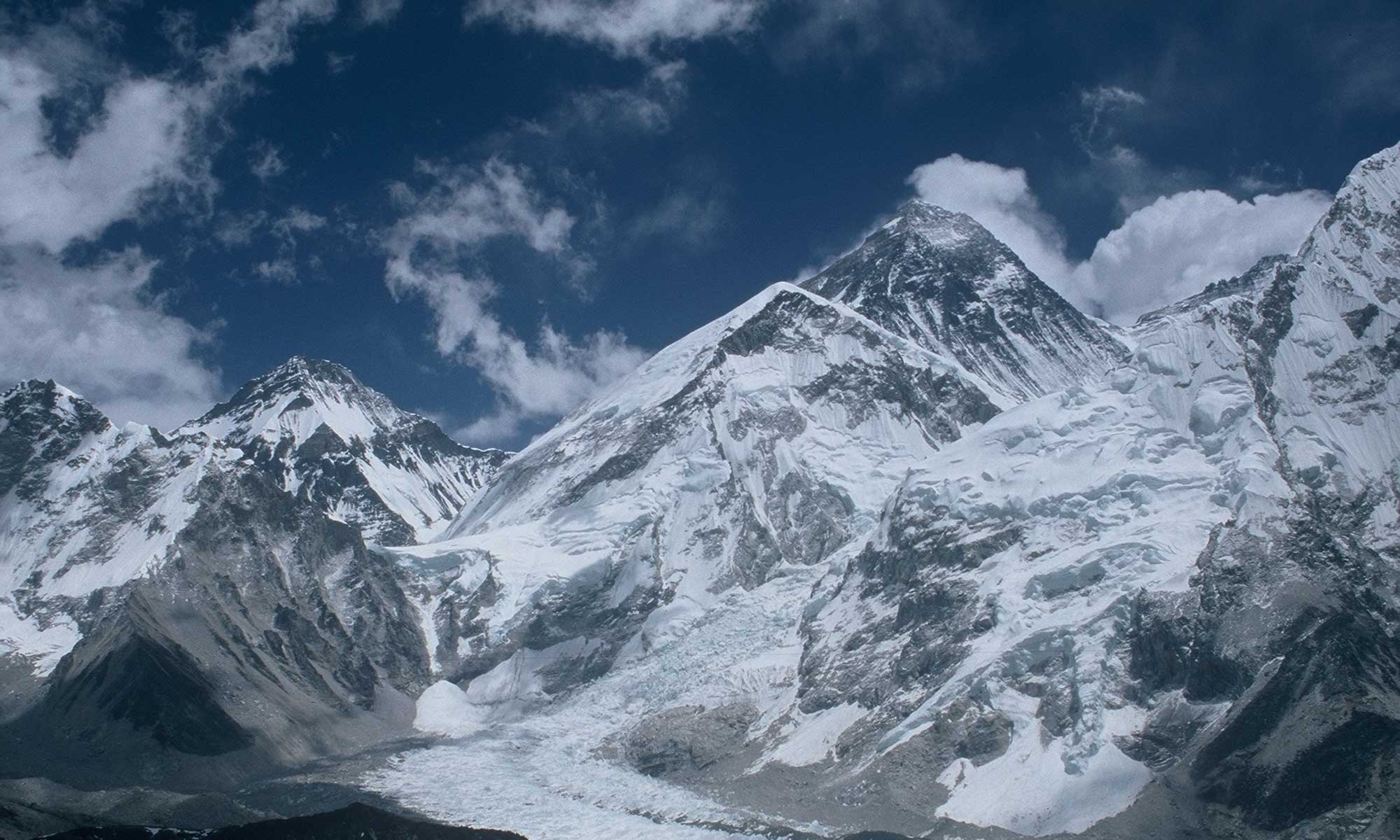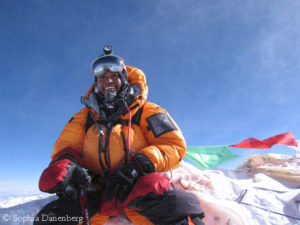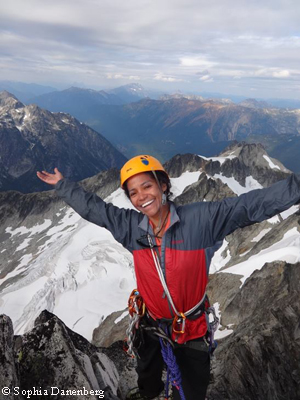She almost forgot the summit picture. When Sophia Danenberg reached the summit of Mount Everest together with the brothers Panuru and Mingma Chhiring Sherpa at 7 a.m. on 19 May 2006, they were alone on the top at 8,850 meters. It was windy, all the surrounding mountains were peeking up from the clouds, Sophia recently recalled in an interview with the US technology portal “GeekWire“: “It’s odd to really be above everything. However, I was mostly focused on getting down. I probably would have forgotten to take a picture if it hadn’t been for Panuru.” The Afro-American was the first black female mountaineer on the highest mountain on earth – which she only learned about on Everest. She climbed the mountain from the Nepalese south side and used bottled oxygen for her ascent.
Danenberg grew up in Chicago. She graduated from the renowned Harvard University in environmental sciences and public policy with honors (Magna Cum Lauda). During her studies, her passion for climbing arose. In November 2005, half a year before she scaled Everest, she reached the summit of the nearby Ama Dablam (6,814 m). In addition to Everest, Sophia summited three more of the Seven Summits, the highest mountains in all continents: Aconcagua (6,962 m, South America), Denali (6,194 m, North America) and Kilimanjaro (5,895 m, Africa).
Today the 48-year-old mountaineer lives in Seattle. She works for the US aviation company Boeing analyzing international environmental policy and maintaining contact with international companies and organizations. I sent Sophia some questions as part of my reports on the “Black Lives Matter” movement in the USA.
Sophia, you summited Mount Everest in 2006. What made you go there that time?
In 2006, I was planning an expedition to a different mountain, (the 8,188-meter high) Cho Oyu, which is usually climbed post-monsoon (in October/November.) However, a company was arranging a climb that year in the pre-monsoon season (May/June), which I was considering. So I called that company and a few others in January to talk to them about their services.
When I called (the expedition operator) International Mountain Guides, the owner asked me about my climbing goals and experience then suggested I try Everest. He thought I could get to Camp 4 on Everest, at least, which would be similar to Cho Oyu, but then I would have a chance at the summit of Everest if it went well. I only had about two weeks to decide.
Did you feel exotic at base camp and on the mountain because of being a black climber?
Base camp is incredibly diverse and international, so it’s hard to feel exotic. However, I did not look like anyone else at basecamp that year. I was not only brown but small and female. Some people thought I might be Indian or South Asian. One of the Sherpas even said he thought I could be from Nepal except I had “better hair” (which was funny because Sherpanis have lovely hair, but I guess he liked curly hair).
Were you even aware at that time that no black woman had scaled Everest before?
I wasn’t sure, but some of the guides who had been working on the mountain for a long time told me after I arrived on the mountain.
How were the reactions back home? There wasn’t a ticker-tape parade, was there?
Most of my friends and family were just happy I was alive. Other than my (now ex-) husband, no one in my family climbs, so they were terrified and thought I was a little crazy. A friend in Connecticut, where I lived, was a freelance journalist and wanted to write an article about me for the large local newspaper, but they rejected the story.
About two months later, my sister in Chicago told the father of one of her son’s friends about me. He was a writer for an independent newspaper called the Chicago Reader and asked if he could interview me for his publication. That article (called “Up Everest, Quietly”) was the first significant media about the climb.
Today, there are more black mountaineers on expeditions to the highest mountains in the world, but they are still rather the exception. What are the reasons for this in your opinion?
Mountaineering is a challenging hobby to begin. It takes a lot of money and time. It’s not a sport like football, basketball, baseball, or soccer that you see on TV and which could make you rich and famous one day. On the contrary, it takes so much time it can hurt your studies or career if you become obsessed. So you only do it if you have a genuine interest in the experience – but how do you develop that interest if you’ve never seen it and maybe haven’t even tried hiking? When I was young, most black people I knew were not even aware of mountaineering, nevertheless had an interest in it.
Sometimes people forget how recently some of the most extreme racist government policies existed. Apartheid (in South Africa) ended when I was a teenager. US Jim Crow laws (they enforced racial segregation in the southern states of USA from 1877 to 1965) existed until my father was a teenager. It takes more than one generation to overcome that level of systemic racism, and change will come in more fundamental parts of society first (work, school, relationships).
It’s not surprising that a hobby like mountaineering would lag. However, I believe there will be a lot more and more black climbers in the next 10, 15 years. As more black people do it and introduce it to their children and communities, I believe the number of black climbers will grow exponentially.
Have you personally experienced discrimination on the mountain? If so, what happened?
It’s likely, but it was probably so minor, I didn’t notice it. You get used to just ignoring a lot of things. I experienced more blatant discrimination in the climbing community when I was off the mountain when I didn’t have my clothes and gear on. The most common thing is the constant assumption that I am not a climber or a beginner. I used to think that’s just how all climbers treated everyone they didn’t know.
It wasn’t until I had been climbing for years that I realized I was treated differently. My white male partners noticed that I was treated differently and would get irritated on my behalf. While I didn’t know anything different, they were aware of how they are typically treated and could see the difference. There was even a time when I was teaching my boyfriend to climb, and everyone assumed he was teaching me, even though I was clearly leading.
How do you feel about the current protests against racism, not only in the USA, but worldwide? Do you think they will also have an impact on mountain sports?
The support worldwide has been astounding. In the US, I am cautiously optimistic that we have hit another point in time where there will be fundamental changes. I think it has to have an impact on mountain sports because racial equity has become a priority for so many individuals of every race, inevitably a lot of them are or will become climbers. There are also a lot of young activists right now who are working to transform outdoor recreation to be more inclusive, welcoming, and caring.





I salute you woman.!!such a brave soul.wish i have the money to climb mount everest.